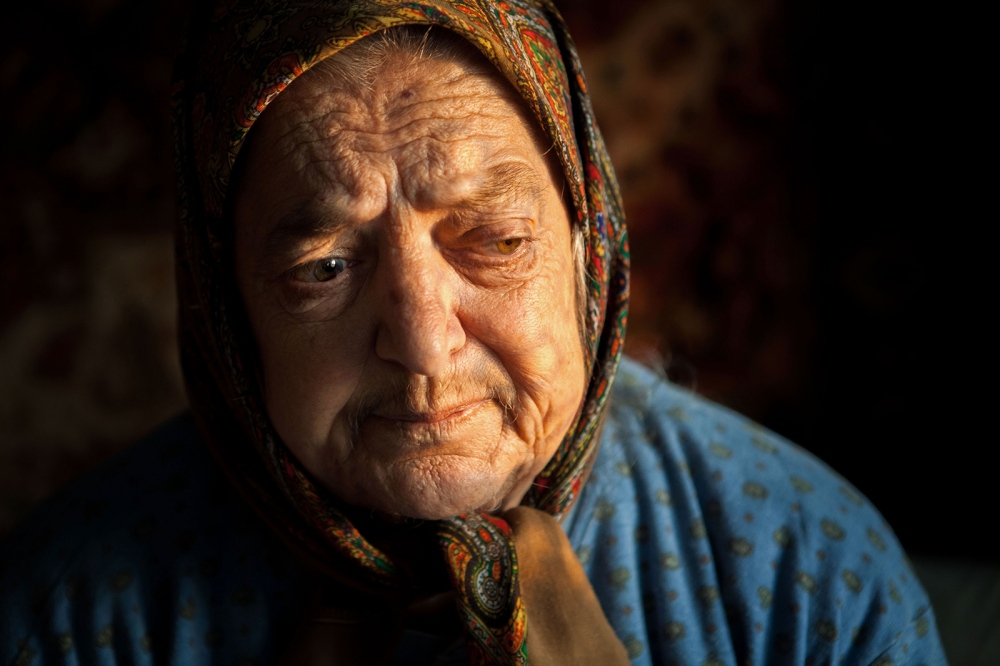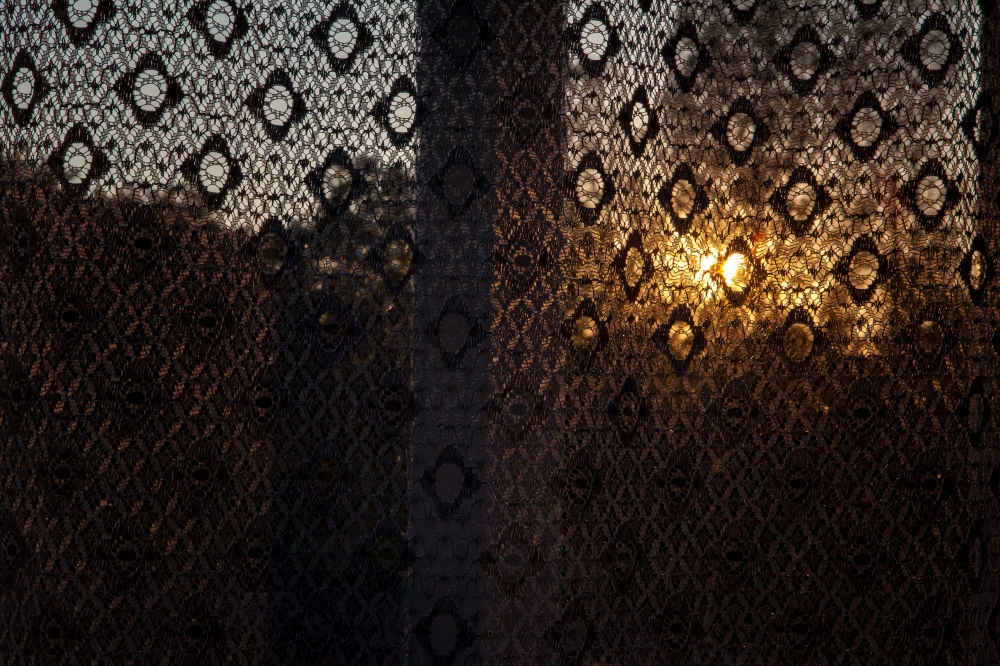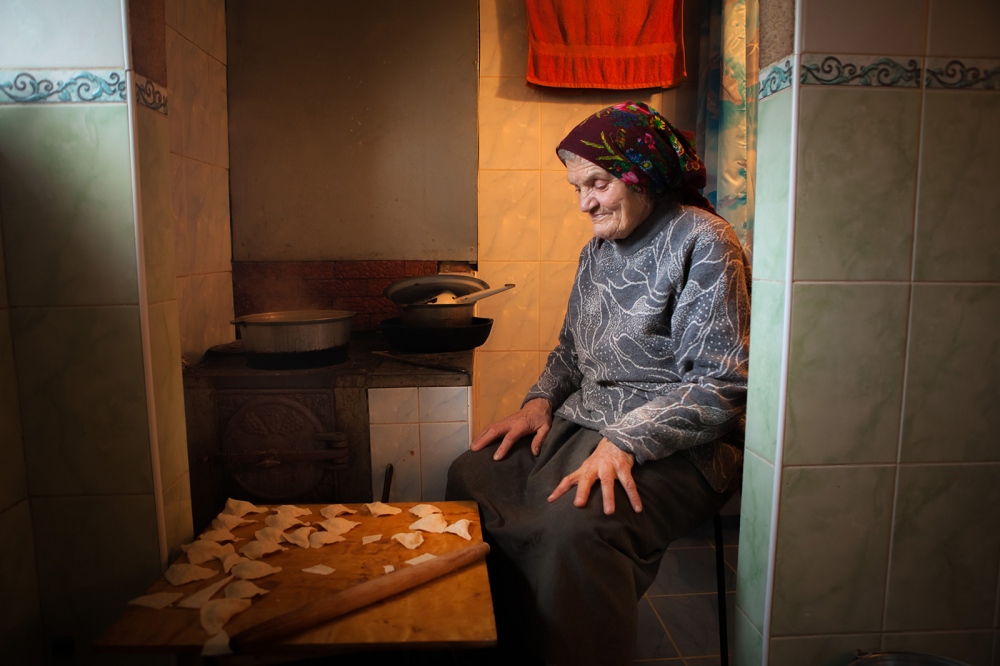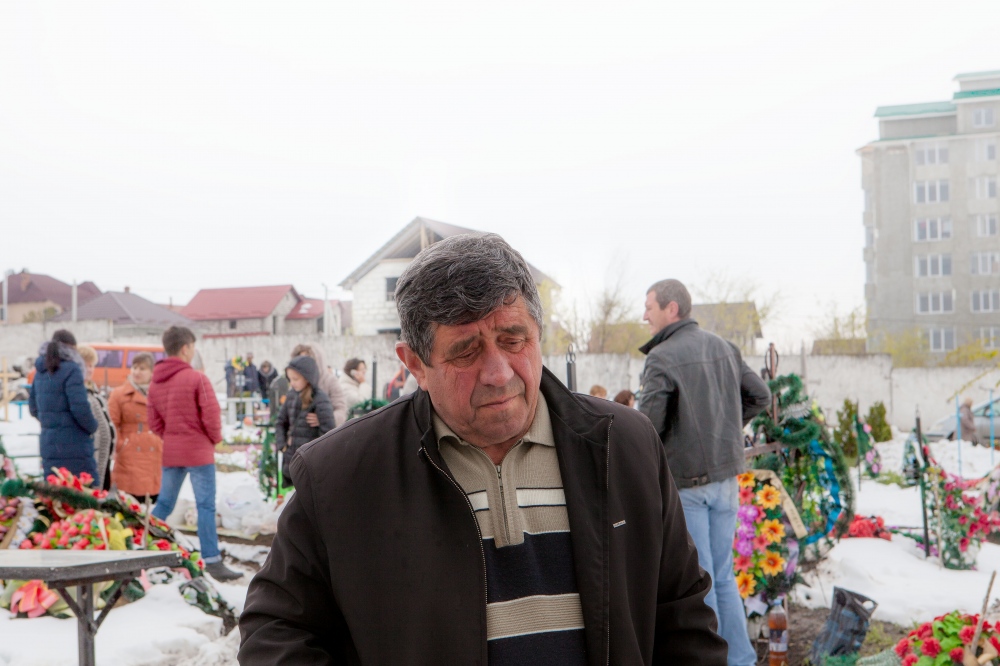13 of 53
© 2025 Clary Estes
Many deportees, having found a new willingness on the part of Moldovan citizens to hear their stories, have taken to writing down the details of their life for future generations to read.
Here is an excerpt of Pasha's writings about her deportation, starting from her birth through to her life in Vadeni with her sisters. She writes in the Romanian language using the Cyrillic script, a common tendency in the older Moldovan generations. In fact, many of the old Soviet era books still sitting on library shelves in rural villages are Cyrillic written Romanian books and are quickly becoming obsolete as the younger generations are choosing either Romanian books written in the Latin alphabet or Russian books written in Cyrillic.
Graur Parascovia Nichifor
Nr.1
I was born in the village of Vadeni, in the Soroca raion, in 1938 on May 16. My mother had 5 children: Nadejda, Parascovia, Andrei, Maria, and Ana. We had a joyful childhood; we were happy. We played and sometimes we would [even be a bit naughty]. [For example, once,] my neighbor and I opened the basement and we saw a [pot full of honey]. We took pickled cucumbers and [dipped them in the honey and ate them]. We forgot to close the lead on the pot because our [mothers] were looking for us. When they found us we were [covered in honey] from top to bottom. When my [mother] saw us she [quickly] took us to the shower and changed our clothes.
Nr.2
The time to go to school came. I liked to go to school and [I liked to study]. I had good teachers and I will [never] forget them: Alexei Ivanovici, Ana Mihalovna, Anatolii V, and Iulita Ef. I will [also never] forget my classmates: Vera, Miron, Valiuha, Serofima, and Fiodor. But this happy childhood turned into a dark Stalinist childhood. Soldiers came and took our house. I [will never forget this to the day I die], how [the night we were deported] our neighbor came [and gave] us some bread for the road, but the soldiers
Nr.3
threw away [the bread that was so precious to us]. Crying we [arrived in] Soroca where we stayed in prison several days and later they took us [in a car, which in those days we called] "black ravens" to [the town of] Floresti. From there they put us on [an animal transport train car], [filled with other people]. The [children had no] water, food or toilets. It was very dirty there. They took us to Odessa and later to Moscow. [The children were separated] [from the adults] and [they] would give us white bread. I felt pity for my mother and I would take [my] bread to her. Every day they would take us [out during] our "walk time."
Nr.4
And there we would listen to a lady who would sing and I remember that song as a poem. I couldn't understand [at the time] it because it was in Russian [and I did not yet speak Russian]. But I remember the words;
I was orphan
I was sick
I was 16
I am tired of everyone and of this life.
From Moscow they sent us to the Cuibisev, Dmalbul village in Kazahstan, in the Ottar Krasnoiarschii raion, Krasnii Okteabri. The trip there was terrifying and everyone would cry. We traveled for two months and the commander [who transported] us had to sign a document [stating we had arrived].
Nr.5
My mother would say every day, "He is a good man and [he notes who the] bad and good people [are]." The good people didn't come from Stalin or from Moscow and it was not them who took our house and sent us far away... [After we arrived to Kazakhstan] we started attending to a new school where we didn't know anyone. But the director [was very kind to us]; she gave us books for free, but we [were held back a grade] because we didn't know any Russian, however we became accustomed to [our new situation].
Nr.6
At school life was good. I got along well with the students and teachers: Ismailova Maria (the director), Piotr E, Nicolai B, and Faina Gr. I wish them good health. I will never forget my classmates: Sura P, Raia C, Tamara P, Volodea B - it is [impossible for me] to forget [Volodea]. [One day,] he fell in the mountains where there was a great deal of snow. We searched for him for three days. [He died.] May he rest in peace; he was a good student. After finishing the 7th grade, I had to leave to the school in Krasnoiarsk [in order to continue my education.]
Nr.7
I had to walk 3.4 km [to attend the new school], [which] was [made more difficult because] I needed to help my mother [take care of our house]. She [had procured two] pigs to [ensure we could have] food and clothes. Because I was the oldest I would help her [feed the] animals. [After caring for the animals, when I arrived to our house] I would [be] frozen because I had to walk in rubber boots, [wearing only] a skirt. It was hard to get warm again because our house didn't have heating. One day, as I was walking to school and I fell down on the side of road. Some strangers found me and took me to the hospital and I had a surgery because I had appendicitis.
Nr.8
The interns operated on me because the doctors were gone. The surgery went well, but not that well. I came home and [the next day] was the holiday Duminica Mare (Holy Sunday) and I wanted to help my mother and be praised for having cleaned the house. I started cleaning and grabbed a heavy bucket full of water and [my stiches] broke and they took me back to the hospital where they [had to] sew me back together; [I was in] a great deal of pain. Not much time passed [after the surgery] and the doctors suggested I return to my country, Moldova, [where there was] better weather.
Nr.9
I was able to leave with the help of my director and the classmates. They gave me money [for the journey] and I am grateful to them for that. I [arrived in Floresti at] my sister Nadia's place [where she and her husband were renting a house and working] at the [local] tobacco factory. I went to school until the 9th grade, but my happiness didn't last because I started hearing rumors [that Nadia's husband did not want me to stay with them] and so I started looking for a job. I got a job with the milk factory in Floresti [where I worked] in the lab.
Nr.10
The director ordered me to work in the village of Ciutmuleni. I was paid 35 rubles per month. I was happy to earn my bread. I lived at the factory. I also helped around the building. So with God's help, the sun [began to shine on our lives]. Finally, our mother came with my dear sisters, Ana and Maria. I then went to the director to ask
Nr.11
if I could change my job and be sent to the village of Alexandrovka because it was closer to [our home village of] Vadeni [where my mother and sisters had returned to]. He didn't say no and I'm grateful for that. But in 1956 the milk factory closed. So I came home [to Vadeni], where my mother and sisters where living in a small hut. As I walked near
Nr.12
our small house I was so sad. I went walking to the town of Soroca to request for a house for us, but the local authorities never responded to my request. There was no bus running [between Soroca and Vadeni] so we walked down the hill from the neighboring village of Dumbraveni. A car stopped and told me to get in because they were going in the same direction. I stared at him and recognized [that it was] Vanea from Alexandrovka village [where I had lived while working at the milk factory].
Nr.13
Our friendship started when I was 19. I was ashamed to show [him] where I was living, but he learned about it without me telling him. From that day, we started dating and on June 11, 1957 we got married [and I never regretted it]. I have [so much love and respect for my] husband.
Nr.14
He worked for 42 years as a driver. He would go to work early in the morning and come home late at night, but he always found time to help me. We lived together and in the autumn of 1957, [Vanea was in an] accident with his cousin, Grigori, who died 6 weeks later, and my sister-in-law, Vera, was left alone with her 7-month child. They were building a house in Floresti and
Nr.15
our parents moved in with her to help. We were left alone in our parents house as a result. In 1959 our [first son] was born, Vitale. He was born on February 4. His father was very happy and thanked me for him. We had another great happiness in 1961 on March 2nd when
Nr.16
Leonid was born. More happiness was not needed. We were very happy. Maybe at times it was hard but [as we watched] them grow we were happy. When [Vanea] came back from long trips no one would take him away from the kids... I was poor when we married... I had only one pillow and a blanket given by friends and relatives. I can't forget that in our living room we had 4 corners [where we kept our dowry.] My mom [had prepared a dowry] for all of her
Nr.17
four girls [before our deportation]. Everyone respected our mother because she was hardworking. Our dowry was stolen by the enemy (the Bolsheviks). [My son], Vitalie, when to school, studied well, and when he was in 3rd grade he went to the school in the village of Frumusica. But [at the time] Leonid was in 1st grade and told me, "I want to go with my brother." So every morning I would send them together to school.
Nr.18
I would [give them a pot of warm embers] so that they could walk without [trouble in the winter]. In the village, the school [only provided classes] until the 4th grade. I loved to go to school and [and listen to the teachers]. The director, Mihail D., was happy when parents came. I was on the parent's committee at the school, so I was at the school very often. I [enjoyed making my son's lunches] - something good, a "surprise". [My sons] never lacked clothes, bikes, or soccer balls. Vitalie played the accordion. [As time passed, Vanea and I realized that we] needed to build our house.
N.19
We demolished the old house and started building the new one. We had to deepen the well because [it had run dry]. We planted trees and built things for our family. People in the village liked us; we were godparents to many children; we regularly attended church. So the boys finished school. Vitalie graduated after the 10th form, and Leonid after the 8th form (Moldovan grades are divided in forms and students can decide the level of their education). [While Vitalie was unable to], Leonid was able to study at a sports college and graduate with good grades. [One day], Ion our neighbor, came and said,
Nr.20
"Small children don't let you sleep, but the old ones don't give you a chance to live in peace." I thought "What is he talking about?" But this is life. Vitalie joined the military [and was stationed] in the town of Leningrad. I went to see him, but I could not recognize him. All of [the young soldiers] were so handsome. He was transferred to Murmansk with the marines. He wanted to be a marine. Leonid was in the sports department of the army in Odessa. He served in the same place his grandfather, Alexei, and his father did. So, Odessa was like a home to us.
Nr.21
Guests from Ukraine came and saw how well he was playing soccer and took him to Hmelniki. After the military, Vitalie started working as a driver, just like his father. He got married. We had a beautiful wedding. The years passed, [but eventually a mournful period] came for us. Our dear mother died. [I will always remember] her hardworking feet [that never rested, and hands] that raised the five of us [children] by herself. For us she remained young and beautiful. May she rest in peace.
Nr.22
God made it so that we lost our parents-in-law and our cousin, Vera. So instead of celebrating on Duminica Mare we [mourned]. It was painful and sad because our [son] Vitalie died at the age of 45. Four years later our son Leonid took us to stay with him in Ukraine where we lived for 6 years. At this time our sister, Nadejda (spelled Nadia elsewhere in this project), died, as well as our brother, Andrei. It was such a sad time for us. It was hard to say goodbye to our loved ones. And on April 4, 1993 my husband, Vaniusa, died. [He was] all that I had left; [he was] kind, patient, and hard working; he worked as a driver for 42 years.
Nr.23
It is hard [for me] to forget [that I am] alone, [I have pain in my legs]. My heart and bones hurt. [After my husband's death] I was forced to write to my sister, Ana, [and ask her] to take me [back] to Moldova. Thank you to my family for taking me in. With Ludmila and Alexei I have a good relationship and I thank them for their care. Because of the pain [when I wrote to ask for their help] I didn't realize that I was writing in Russian; [I can't] thank them enough, but the Holy God sees everything and I pray that he keeps them safe. All of their children: Pavel, Ioana, and [my son] Leonid. [I hope that they gain] happiness from [their own children], [are] healthy, happy and [have their] peace on earth. Please live in peace with each other.
Nr.24
I wrote a little bit about my memories [explaining] the pain that we went through in Kazahstan, but I [I have another particular memory from] 1956. I came to Vadeni village to see my brother, Andrei. At the cross [at the head of the village] I bowed and said good morning to people [as I walked through town] and a man asked, "Who she is?" [A local official] responded, "She is the daughter of Nichifor Graur. I sent them away, never to return, but the devil came back." I was sad, but my brother Andrei hugged me and said, "Leave it, you will not eat his bread. Luca Sochirca, we have our bread."







!["The deportation occurred...ible [Gulag] conditions."](https://cloud.visura.co/237527.story_x_large.jpg)









































